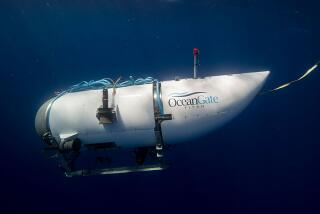HMS Bounty sinking to be investigated; victim was âvery concernedâ
The U.S. Coast Guard has called off its search for a missing sea captain and on Friday ordered an investigation of why the tall ship HMS Bounty set sail and sank as Hurricane Sandy was bearing down on the Eastern Seaboard.
On Sunday, as Sandy churned offshore in the Atlantic, the Bountyâs owner reported losing contact with the replica three-mast sailing ship and its 16-member crew. Soon after, the Coast Guard launched a recovery effort that saved 14 people and recovered the body of 42-year-old former USC song girl Claudene Christian.
The body of Robin Walbridge, the Bountyâs captain for 17 years, was not found by Coast Guard rescue teams.
Rex Halbeisen, a friend of Christian, said he received an email from her before she died at sea saying she was worried about the storm and the condition of the ship.
INTERACTIVE: Before and after Hurricane Sandy
âShe was very concerned for their safety and was âpraying to God that going to sea was the right decision,â â Halbeisen told the Los Angeles Times.
âYou know me, I am not a mechanical person but the generators and engines on this ship are not the most reliable,â Christian said, according to email text provided by Halbeisen. âThey are always stewing over them. I would hate to be out to sea in a storm an [sic] the engines just quit or we have no power.â
He said he turned Christianâs email over to the Coast Guard, which said in a statement that it would investigate âevery aspect of the accident.â
The Bounty, built in 1960 on an 18th-century design, was powered by two 375 hp John Deere diesel engines, according to specifications from the shipâs owner, HMS Bounty Organization LLC.
VIDEOS: East Coast hit by deadly storm
Those engines apparently failed, as did two bilge pumps designed to pump out the water that naturally collects in the bottom of such a ship, Coast Guard spokeswoman Alex Tate told the Los Angeles Times.
The Bounty sank, buffeted by Sandyâs 18-foot waves and 40 mph winds.
âI was somewhat surprised to discover that the Bounty was out there, considering that there was this steady drumbeat of forecasting of significant weather,â Jan Miles, captain of the Pride of Baltimore II told the Los Angeles Times. He said that decision on whether to stay at sea or in-harbor during a storm is far from simple.
Dan Moreland, captain of the Nova Scotia-based Barque Picton Castle, and an acquaintance of Walbridge, said he refused to take his ship to sea last week because of the storm.
âIt was an easy decision to make,â he told the Chronicle Herald. âItâs black and white; there are no nuances with this. Itâs a huge system and that made the decision very simple.â
He added, âWhen I first heard the Bounty was out there, I thought, âYouâve got to be kidding.â ... I donât understand this one at all. This is a huge system, there is no way of avoiding this, thereâs no dodging and weaving around it.â
In a posthumously published public-access TV interview from August uploaded to YouTube on Monday, Walbridge said âwe chase hurricanesâ and gently boasted of surviving 70-foot waves with the Bounty.
âYou try to get up as close to the eye of it as you can, and you stay down in the southeast quadrant, and when it stops, you stop, you donât want to get in front of it, you want to stay behind it, but you also get a good ride out of a hurricane,â said Walbridge, 63.
A call to the HMS Bounty Organization was not answered Friday. Earlier in the week, Tracie Simonin, president of the company, told the Associated Press that the crew had been in constant contact with the National Hurricane Center and had been trying to go around the hurricane.
The Bounty had been headed from Connecticut to St. Petersburg, Fla., when it foundered 90 miles southeast of Hatteras, N.C.
Records show that the Coast Guard had conducted several inspections of the Bounty in recent months, with the latest coming Sept. 24 in South Portland, Maine. The shipâs last reported deficiency came in May 2011, when an inspector noted that the ship had some old nautical maps and faulty documentation after âsubstantialâ tonnage alternations. Those problems were reported to have been corrected as of September.
ALSO:
Federal judge orders new studies on Honolulu rail project
As temps fall after Sandy, New Yorkers seek refuge in shelters
Post-Sandy misery: Power out, toilets clogged, temperatures falling
More to Read
Sign up for Essential California
The most important California stories and recommendations in your inbox every morning.
You may occasionally receive promotional content from the Los Angeles Times.











